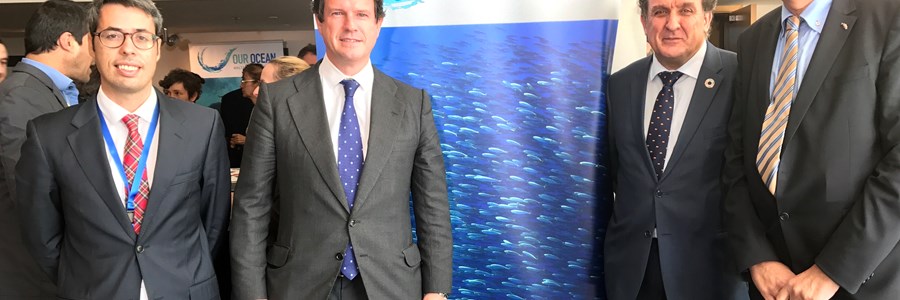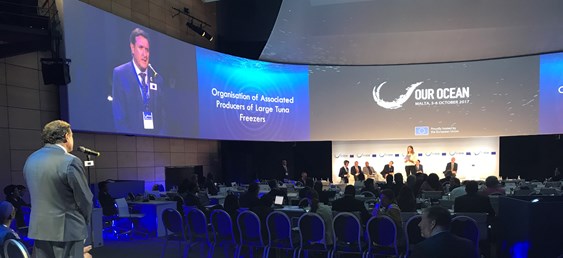EU fishing industry makes significant commitments to preserve and sustainably use ‘Our Oceans’

The EU hosted the fourth high-level ‘Our Ocean’ conference in Malta on 5-6 October 2017 aimed at bringing together world leaders to propose commitments to face global marine challenges and sustainably use the seas and oceans. Europêche members were honoured to contribute concrete actions, through commitments, to address these emerging issues. These pledges notably focused on the reduction of marine litter, improvement of fisheries management and fight against illegal fishing.
In line with the UN Sustainable Development Goals, ‘Our Ocean’ Conference has set ambitious political actions to mobilise policy-makers and stakeholders to put forward viable solutions to tackle environmental threats. These actions seek to reduce marine pollution, manage marine resources sustainably, mitigate climate change and preserve the marine environment. Building on private initiatives, members of Europêche presented several commitments to improve and develop sustainable fisheries across the world.
The tuna fishing fleet grouped in OPAGAC[1], representing 6% of the world tuna catch, presented its ground-breaking Responsible Tuna Fishing certification. It guarantees the fulfilment of the best practices in three scopes of the activity: respect to the environment and the species caught; the best control mechanisms in the fishing activity; and the working and safety conditions of the crews.

Further to the positive collaboration with Waste Free Oceans and KIMO[2] to tackle the growing problem of marine litter, CEPESCA[3] committed to remove 200 tonnes of marine debris by 2018 thanks to their partnership agreement with ‘ECOEMBES’ and ‘Ecoalf’. 60 ports and 770 trawlers will be involved in this project called "Upcycling the Oceans".
Similar commitment to address the problem of marine litter was made by VisNed and PFA[4] through the signature of the 'Green Deal for a Clean Sea'. It requires separating waste produced on board the fishing vessels or caught in the fishing nets; recovering or recycling the separated waste once ashore and exclusively using biodegradable cleaning products. The overall goal is to achieve by 2020 the shared objective to usefully recover or recycle 95% of the waste from business operations and gear.
Building on the successes of our membership in the Social Dialogue Committee for Sea Fisheries, Europêche has been critical to ensure harmonised and better working and living conditions in the sector through their agreement transposing the International Labour Organization (ILO) Work in Fishing Convention, C188 into EU legislation[5].
In addition to the EU Regulation[6] preventing the removal of fins of sharks on board vessels, the EU longline fishing fleet committed to concentrate all shark landings in EU ports to improve control and minimise IUU risks; being a critical step towards implementing a full traceability scheme.
Following the EU legal reform on the management of the EU’s external fishing fleet[7], our vessels keep playing a leading role on sustainability and best practices since the highest transparency, control and environmental standards are met by our fishermen.
Europêche members are also closely collaborating with Governments and international bodies to produce a definition of small-scale and recreational fishermen. This will certainly help prevent IUU fishing and increase control on the fish stocks.
Javier Garat, President of Europêche, stated: 'The fishing industry has answered the call from the EU, greatly contributing to the success of Our Ocean Conference 2017. But none of this is news; for years our fishermen have been involved in many actions aimed at securing a sustainable future for our fisheries resources and our coastal communities. We are proud to continue showing our strong commitment to tackle global marine problems. Europêche members closely work with scientists, governments and civil society to face these threats, particularly by increasing knowledge on data deficient stocks, increasing selectivity and minimising any possible impact on the environment.
Garat concluded: ‘The EU must be proud of its commitment towards sustainable management of the seas and oceans. Now it is time to ratify and truly implement existing Conventions by all international players to improve ocean governance as well as strengthen coordination with international and regional actors.’
Ends
Europêche represents the fisheries sector in Europe. Currently, the Association comprises 15 national organisations of fishing enterprises from the following 10 EU Member States: DE, DK, ES, FR, IT, MT, NL, LV, PL, UK.
Press contacts:
Daniel Voces, Acting Managing Director of Europêche: +32.2.230.48.48 daniel.voces@europeche.org
[1] Spanish Producers Association of Big Tuna Freezers
[2] Local Authorities International Environmental Organisation
[3] Spanish Fishing Confederation
[4] Pelagic Freezer-trawler Association
[5] Directive 2016/0124(NLE)
[6] Sharks caught by EU vessels anywhere in the world must be landed with their fins naturally attached as strictly provided by REGULATION (EU) No 605/2013 of 12 June 2013 amending Council Regulation (EC) No 1185/2003 on the removal of fins of sharks on board vessels
[7] 2015/0289 (COD)
Sources: Europeche
Attachments:
Tags: malta, Our Ocean, oceans, conference, sustainable, un